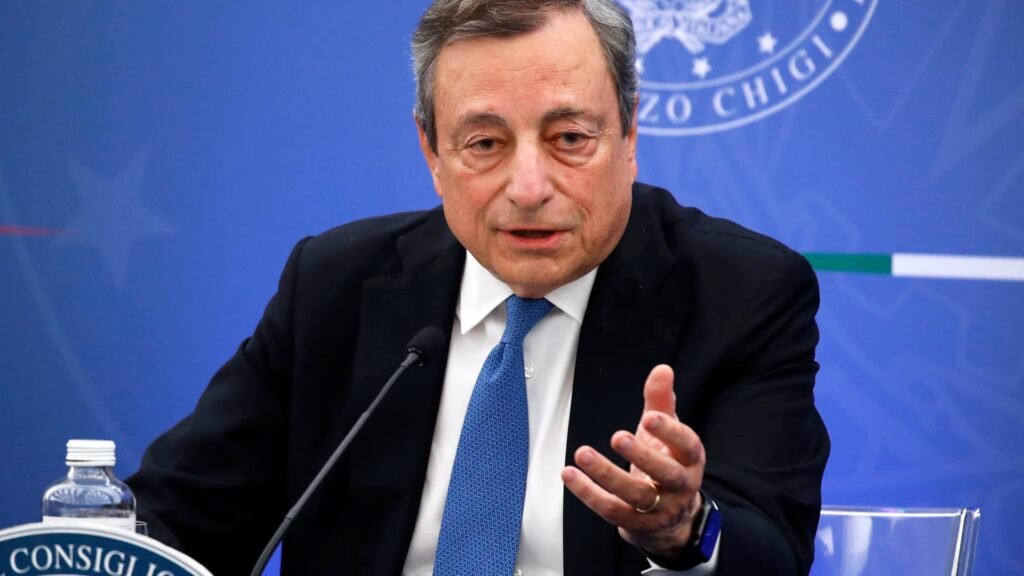Italian Prime Minister Mario Draghi during a press conference at the Prime Minister’s Office Multipurpose Hall on July 12, 2022 in Rome, Italy.
Massimo Di Vita | Mondadori Portfolio | Getty Images
The European Union needs up to 800 billion euros ($884 billion) in extra investments per year to meet key competitiveness and climate targets, according to a report by economist and politician Mario Draghi.
The report said the EU’s goals of strengthening its geopolitical importance, social equality and decarbonisation are threatened by weak economic growth and productivity compared to the US and China.
The wide-ranging review, led by Draghi, who served as Italy’s prime minister and European Central Bank president during the euro zone debt crisis, found that EU priorities must include lowering energy prices, boosting competitiveness, coordinating industrial policy and boosting defense investment.
The report noted the EU’s reliance on China for critical mineral resources, and China’s reliance on the EU to absorb its industrial excess capacity, and said the EU needed to adapt to a world in which “dependence has become vulnerability and countries can no longer rely on others for their security.”
The report further notes that the EU’s greater trade freedom would put it at risk if the trend towards more independent supply chains were to accelerate: Around 40% of European imports come from a small number of sources that are difficult to replace, and roughly half of these imports come from countries with which the EU is not “strategically aligned,” the report said.
“The EU needs to develop a real ‘foreign economic policy’ that coordinates preferential trade agreements and direct investment with resource-rich countries, building up stockpiles in selected key sectors, and building industrial partnerships to secure the supply chains of key technologies,” the report said.

The EU needs to avoid rising dependency and aim to “harness domestic resource potential through innovation in extraction, recycling and alternative materials.”
Other goals include fully implementing the single market, which includes 440 million consumers and 23 million businesses, by reducing trade frictions.
The EU must also ensure that competition policy does not become an “obstacle to European goals”, particularly in the technology sector.
The European Union also needs to address “massive investment needs not seen in Europe for half a century” by combining private finance with public support. The EU also suffers from an “innovation deficit” that needs to be addressed through reforms to research and development funding and policies, the report said.
The report called for greater policy harmonization and centralization of funding in many areas. For example, in clean technology development, it found that Chinese subsidies and huge domestic support from U.S. anti-inflation laws have left manufacturers struggling to compete internationally, while funding is fragmented across different programs.

On measures to mobilize private capital, the report recommends transitioning the European Securities and Markets Authority (ESMA) from a coordinating body for national regulators to a single regulator for securities markets across the EU that could focus on overarching goals, similar to the U.S. Securities and Exchange Commission (SEC).
To speed up policy-making, the report suggests limiting the number of voting items that require the support of an absolute majority of member states.
Funding Questions
Draghi’s report said the size of the EU budget, its lack of focus and risk aversion are hindering public and private investment. The report added that the looming deadline for repayment of the huge debt-financed NextGenerationEU COVID-19 recovery programme, which begins in 2028, means the EU’s effective spending power will decline unless a decision is made to raise new funding.
He also said certain areas of the spending proposals, such as defence projects and cross-border electricity grids, would require “common financing”, adding that the EU should move towards “the regular issuance of common safe assets to enable joint investment projects between member states and support the integration of capital markets”.
Germany, which has traditionally resisted moves towards additional common borrowing, reacted to the proposal on Monday.

“The pooling of risks and responsibilities raises problems for democracy and finances. Germany does not agree to this,” Finance Minister Christian Lindner said, according to a Reuters report translated by CNBC.
To achieve defense, digitalisation and decarbonisation targets, the EU’s total investment-to-GDP ratio would need to rise by around five percentage points per year, back to levels of the 1960s and 1970s, according to the study.
Overall, the set targets would require additional investments of at least 750-800 billion euros per year, according to European Commission estimates.
The report was commissioned last year by European Commission President Ursula von der Leyen, who was elected to a second five-year term in July and is due to appoint new commissioners this week.
Some analysts were quick to pour cold water on the scale of the resulting reforms.
In emailed comments ahead of the report’s release, Lorenzo Codogno, founder of Lorenzo Codogno Macro Advisors, said the findings “will spark significant debate about the future of the EU/eurozone, but don’t get your hopes up.”
“Nothing is likely to happen until the new commission is fully operational, and even then, the political situation among member states is complex, divided and unstable, making it difficult to garner the necessary political support to act. Still, we cannot rule out the possibility of unexpected developments, so the ensuing political debate needs to be closely monitored,” he said.
David Roche, founder of Independent Strategies, said the report would not have an immediate impact on the markets.
“The productivity gap between the US and the EU is [Draghi’s] “There are proposals to integrate supply-side sectors and markets at national level and to significantly increase public and private investment. But this will not happen,” Roche said in a note on Monday, saying Europe was “paralyzed by populism and incompetence at the national level.”
–CNBC’s Sophie Kiderlin contributed reporting.



